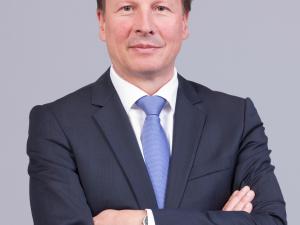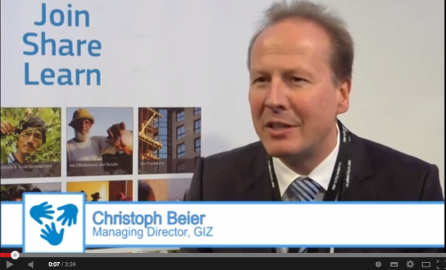GIZ, a German federal organisation, assists the German Government in achieving its objectives in the field of international cooperation for sustainable development. At the recent European Development Days, Managing Director Dr Christoph Beier reflected on the changing landscape of development cooperation, and what he considers to be the priorities of the Post-2015 Agenda.
|
In 2000, Dr Christoph Beier formally joined GTZ. He was appointed Managing Director of GTZ in January 2010. GTZ was renamed GIZ in 2011. Since January 2011, Dr Beier has been Vice-Chair of the GIZ Management Board. In this position, he is also Chief Operating Officer (COO) of GIZ, holding power of the Regional Departments of GIZ including the Germany Department, International Services as well as the Business Units Migration, Global Partnerships/Emerging Economies and Industrialised Countries. Dr Beier has written numerous articles and publications on development policy issues. He also holds numerous honorary posts. He is a member of the Advisory Board of the Centre for Agriculture in the Tropics and Subtropics at the University of Hohenheim, and is on the Board of Trustees of the Institute of Development Research and Development Policy at the Ruhr University in Bochum. He is a member of the Steering Committee of the Alliance for Financial Inclusion and of the Indo-German Consultative Group. |
Question: The development landscape is very different now from in 2000, when the MDGs were framed. What do you think are the main shifts?

Dr Christoph Beier: First of all, I think the old paradigm of paternalistic north-south aid business has to change, and it is changing at the moment. We are entering in to a new phase of new partners, new ways of south-south cooperation, new ways of joint working on global issues - like global public goods, for example.
I have an example of this, where our role is also changing:
We are working on the Alliance for Financial Inclusion with the Bill and Melinda Gates Foundation. This is a south-south network where we are facilitating the cooperation between the governors of central banks all over the world, exchanging experiences of how they can improve the access of marginalised people to financial services.
This is a very powerful tool; it is totally driven by Central Bank governance and has been very successful - so successful that they could not only achieve their objectives by learning from each other, for example, how can we implement mobile banking from Kenya in the Philippines? Or how can we use the experience of branchless banking from Brazil in other contexts? - they have not only been successful in exchanging their own innovations to establish global learning, but they have also been successful in interacting with the G20 formats in order to raise the issues better and articulate the needs of those countries with the powerful G20 group. This is a very good example where you can see that south-south cooperation can become very powerful, effective and efficient.
The other example is that we have to seriously re-think our partnerships with the private sector, with civil society, and with all other powerful partners. I would like to stress the private sector: the Ministry of Economic Cooperation and Development commissioned us (GIZ) with the public-private partnership facility, and we have implemented more than 3000 projects, together with the private sector
In this framework of new partnerships, I very much hope for more intensified and better cooperation between member states and member state organisations, like ours in consortia with EUNIDA (European Network of Implementing Development Agencies), and the Practitioners Network for European Development Cooperation with the European Commission. The Commission, together with the member states, can become much more powerful if they join forces in a partnership way.
Question: What does GIZ consider to be the main priority areas for the Post 2015 development agenda?
I think the big advantage is that we don’t only talk about poverty and hunger. These are still key topics in our business, of course, but I think since Busan we have understood that there are so many other policy fields.
Capacity development is key in this process. Money is around, but how to use it properly is the big question and to make the best use of the money available for the sake of the people, the climate, for the sake of sustainable development you need capacity at all levels.
I feel that a very important side of this is to look at trade issues, to look at migration issues, which is an important issue, be it because of fragile contexts, be it because of climate change.
We do not deal properly with the problem of migration, still. What we have done, for example, is invent a programme that is called Triple Win, where we tried to shape migration patterns where three parties are benefiting: (i) the country that is sending migrants out (ii) the migrant himself, and (iii) the receiving country. If you do not shape migration properly then there will be disastrous consequences. We have shown in our example that if you screen the policies of those countries properly, if you define which group of people should move from one country to another and why, and if you prepare the people properly you will avoid parallel structures in the receiving countries, and you will avoid brain drain.
We at GIZ have been working on climate change for a long time, not only in the field of development cooperation, on behalf of the German Ministry of the Environment. There we do a lot in promoting renewable energies and increasing energy efficiency, for example, in power generators in India, or in reducing C02 emissions.
One other policy field, which will be extremely important for the coming years, is of course peace and security; there is no development without security and no security without development. At GIZ, we have been active in this field for a long time. For example, an important contribution is that we organise the election observers on behalf of the European Commission in the Lebanon, in Ethiopia and Algeria. What’s very much linked is the human rights issue; this will become even more important. We will see the governments of our countries more engaged in the field of human rights and we are ready to support this as much as possible.
This collaborative piece was drafted with input from Carolin Bansbach, and support from the capacity4dev.eu Coordination Team.

(1)
Log in with your EU Login account to post or comment on the platform.
I am sorry that Mr. Beier did not give the proper relevance to the role of the women in the post 2015 Development Agenda. Never we will eliminate both the poverty and hunger and we will have peace and security without focusing in the gender issues. From Education, Health, Agriculture and Climate Change, just to mention some relevant sectors, the role of the women is not well understood by the policy makers and goverment. I would like that the XXI century was remembered as the Velvet Century.
Susana